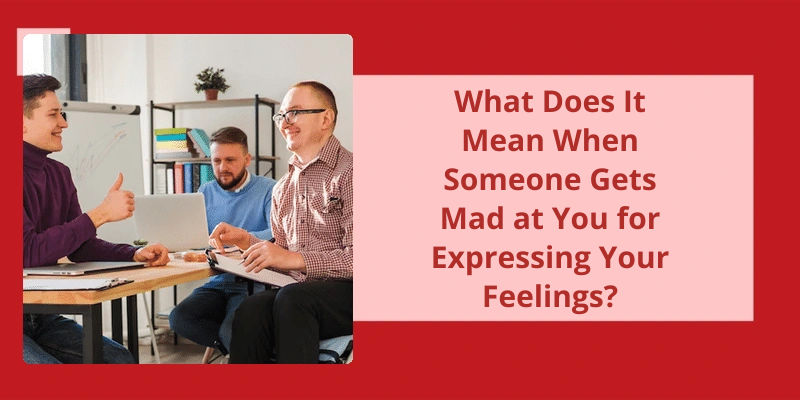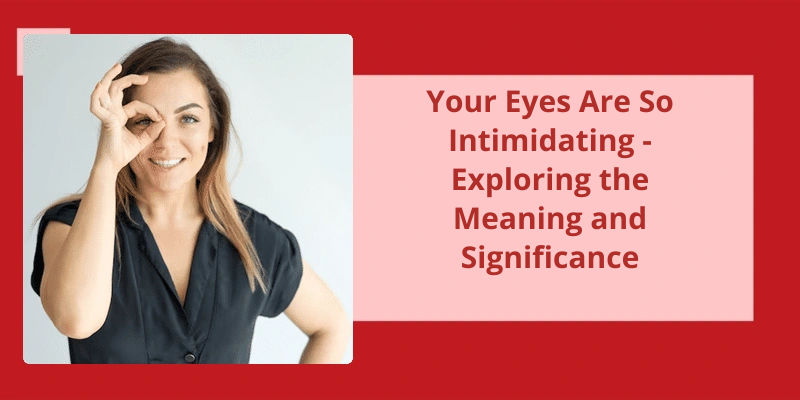Have you ever found yourself in a situation where you felt strongly about something and decided to express your thoughts and feelings only to be met with anger and frustration from the other person? It can be a confusing and disheartening experience when someone reacts negatively to your emotional openness and vulnerability. But what does it actually mean when someone gets mad at you for expressing your feelings? Is it a reflection of their own insecurities or a sign that they don't value or respect your emotions? This is a complex topic that requires a deep understanding of human psychology and communication dynamics. Let's delve into the various factors at play when someone reacts negatively to your emotional expression, and what you can do to navigate such situations with more ease and grace.
Why Do People Get Mad When They Hurt Your Feelings?
It’s important to understand that people who hurt others feelings may not even realize theyre doing it. They may be unaware of the impact their words or actions have on others, and may be caught up in their own needs or desires. This doesn’t excuse their behavior, of course, but it can help to explain why they may react defensively when confronted with your hurt feelings.
It’s also worth noting that some people may not understand the impact of their words or actions on others. They may not have the same level of empathy or emotional intelligence as you do, and may not realize how much harm theyre causing. This doesn’t excuse their behavior, but it can help you to understand why theyre acting the way they are.
Ultimately, it’s important to remember that peoples emotions and reactions are their own responsibility. You’ve a right to your feelings, and it’s not your job to manage other peoples emotions, even if they hurt you. That said, it can be helpful to approach difficult conversations with empathy and understanding, and to try to communicate your needs and feelings in a clear and calm manner.
If someone consistently hurts your feelings and is unwilling to make changes or apologize, it may be time to reevaluate the relationship. You deserve to be treated with respect and kindness, and it’s okay to set boundaries and expectations for how you want to be treated by others. Remember that you’ve the power to control your own reactions and responses, and that you don’t have to tolerate behavior that’s hurtful or disrespectful.
How to Set Boundaries With People Who Consistently Hurt Your Feelings
Establishing clear and consistent communication about your feelings is key to setting boundaries with people who consistently hurt you. It’s important to be assertive and express your needs in a respectful way. Consider limiting your interactions with them or ending the relationship altogether if they continue to disregard your boundaries. Remember to prioritize your own well-being and seek support from trusted friends or a therapist if needed.
Hurt feelings can often lead to unexpected and overwhelming emotions. It’s not uncommon for people to feel angry when their feelings are hurt, as the pain triggers a natural response in the body and mind. However, it’s important to understand why this happens and how to manage these feelings in a healthy way.
Why Do People Get Angry When They Hurt Your Feelings?
Anger acts as a shield to protect the vulnerable part of you thats hurting. This feeling can be especially strong if the person who caused the pain is someone you love or respect. Someone whose opinion matters to you. They’ve hit a nerve, and instead of feeling sad and vulnerable, you feel angry and defensive. You may want to lash out and hurt them too, as a way of protecting yourself and gaining back some control.
In some cases, getting angry rather than feeling hurt or sad can be more acceptable, especially for men. Society encourages men to be tough and avoid showing vulnerability, and anger is seen as an acceptable outlet for strong emotions. Men may feel like they need to mask their hurt feelings with anger or risk being perceived as weak. On the other end of the spectrum, women may also feel that their emotions aren’t taken seriously, and expressing anger is a way to assert themselves and make their feelings known.
Anger can also be a learned behavior. If you grew up in an environment where anger was the go-to response for conflict or where emotions weren’t often discussed, you may have learned that anger is the best way to deal with difficult situations. It can become a habit thats hard to break, and even when it’s not appropriate, anger is the automatic response.
Additionally, some people have a shorter fuse than others. This may be due to genetics or a predisposition towards impulsivity. They may be more likely to react in anger when hurt emotionally because their natural response is to act first and think later. It can be challenging to control this knee-jerk reaction to anger, and it may take practice and counseling to learn how to manage emotions in a healthy way.
Lastly, it’s vital to remember that everyone is different, and we all have our own triggers that set us off. It’s important to recognize and communicate these triggers with those around us before they’re accidentally triggered. By having open and honest communication, we can work towards a more understanding and compassionate society, where hurt feelings arent always met with anger. By taking a step back and trying to understand the root of the anger, we can better handle conflict and come to resolutions that are fair for everyone involved.
How to Communicate Your Feelings Effectively to Others Without Resorting to Anger
- Identify your emotions
- Express your feelings using “I” statements
- Avoid blaming or accusing language
- Listen actively to the other person’s response
- Be open to compromise and finding a solution together
It’s important to understand that emotional pain is just as real as physical pain. Rejection can sting and leave lasting effects on one’s mental and emotional well-being. In this article, we’ll explore how to cope with hurt feelings, especially when they arise from rejection.
What Happens When Someone Hurts Your Feelings?
Feeling rejected can result in a range of emotions such as anger, sadness, and a sense of unworthiness. These emotions can be overwhelming, and it’s essential to process them in a healthy manner. Some ways to cope with rejection include talking to a supportive friend or family member, journaling, or engaging in self-care activities. Additionally, it’s essential to recognize that rejection is a natural part of life, and it doesn’t define ones worth or value as a person.
When someone hurts our feelings, our initial reaction may be to retaliate. However, this response isn’t always the most effective or beneficial. It’s crucial to take time to process our emotions and thoughts before reacting. This can prevent us from causing further harm or making decisions we may regret. It can also give us the opportunity to gain perspective, reflect on the situation, and identify potential solutions.
In some cases, the person who hurt our feelings may not realize the impact of their words or actions. It may be necessary to have a conversation with them, explaining how their behavior affected us. It’s essential to approach the conversation calmly and non-threateningly, using “I” statements to express our feelings rather than accusing the other person. This can lead to a better understanding of each others perspectives and potentially mend the relationship.
However, there may also be situations where the person who hurt our feelings isn’t willing to acknowledge their responsibility or make amends. It can be challenging to accept this, but it’s important to recognize when it’s necessary to distance ourselves from toxic people or situations. Prioritizing our emotional well-being is crucial, and sometimes that may mean letting go of relationships that no longer serve us.
Ultimately, when someone hurts our feelings, it can be a painful experience. However, it’s an opportunity to engage in self-reflection, emotional processing, and potentially strengthen relationships or learn to let go of those that are no longer beneficial. It’s critical to prioritize our emotional well-being and treat ourselves with compassion and care.
The Impact of Childhood Experiences on How We Respond to Hurt Feelings and Rejection.
The way we react to hurt feelings and rejection in our adult lives are influenced by our experiences in childhood.
Conclusion
While it can be difficult to navigate these situations, it’s important to stay true to yourself and communicate in a respectful and assertive manner. It may also be helpful to seek support from a trusted friend or therapist. Ultimately, when we normalize healthy communication and emotional expression, we create a safer and more authentic space for ourselves and those around us. Remember that it’s okay to express your feelings and that you deserve to be heard and understood.






